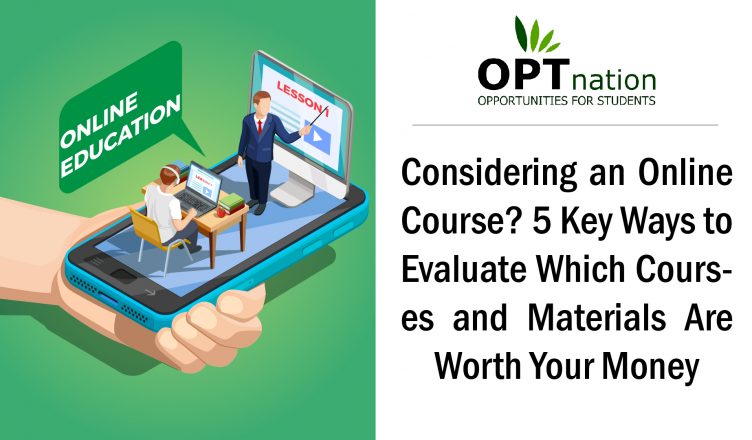Considering an Online Course? 5 Key Ways to Evaluate Which Courses and Materials Are Worth Your Money
We live in an amazing age for education and training, because with online courses and programs available, it’s easier to upskill and improve your prospects than ever before.
Most courses cost cash, and there’s a lot of choice across the majority of niches. That means it pays to play the field and weigh up your options before committing.
Here are some tips on what to look for when assessing the different online courses and providers, so that the ones you choose represent good value for money.
- Consider the resources included
We all learn in different ways, and so it’s worth looking into the extent and the type of the resources that are included in the cost of any online course that’s on your radar. If you are more of a visual learner, you could be better suited by a course that features access to extensive video content and graphics to assist you in your studies.
If you absorb information better when it’s explained to you as part of an interactive conversation, then selecting a program which features face-to-face meetings or virtual seminars is wise. Whatever approach you prefer, don’t overlook this when picking a course. It could dramatically influence the effectiveness of the experience from your unique perspective.
- Check out reviews and comparisons of the best courses
Carrying out a thorough evaluation of every single course and provider out there simply isn’t feasible. Thankfully you can overcome this issue if you read independent, unbiased reviews of the top programs out there.
Of course you’ll need to find reviews that are relevant to the field you’re interested in focusing on, or the particular challenge you want to prepare to overcome.
For example, if you want to become a certified financial analyst and you’re keen to increase your chances of passing the tests needed to get accredited, reviewing CFA exam prep courses will be sensible.
Another option is to search social media for mentions of a specific course or provider. People are rarely shy about voicing disapproval of bad experiences they’ve had with businesses, and this applies to online training schemes as much as anything else.
- Explore the UX
Even if a course is packed with plenty of useful material for you to study, and also has a decent reputation, it might not be the right fit if the user experience (UX) falls short.
This encompasses everything from the way that the interface is laid out to the compatibility it offers with mobile devices. And if you feel that you’d quickly become frustrated when trying to use a training site or app for extended periods, then it could be unsuitable.
This is obviously a somewhat subjective consideration, but then that’s part and parcel of the comparison process; don’t just go with the course that others say is the best of the bunch, but make your decision based on your own interpretation and intuition.
- Establish how your progress will be organized and assessed
Good online courses will give you a means of setting out a schedule of study, providing both a realistic idea of how much work you’ll need to put in, and also how best to organize this around your other responsibilities.
It’s also worth looking into what approach will be taken to analyzing your performance and determining whether you’ve gleaned the right things from the course.
For example, you should check to see whether you’ll be assessed through things like formal tests and exams, or whether you’ll have your progress reviewed by an actual human in a more bespoke way.
The right combination of assessment techniques can make a big difference, and it is helpful to know what you’ll be faced with further down the line when starting a course, rather than being sideswiped by pop quizzes and assessment deadlines out of the blue.
- Understand your own preferences
By this point you should have gathered that you can only compare online courses with your specific needs at the forefront of your mind. This isn’t just about knowing what type of learner you are, but also about recognizing your own strengths and weaknesses in other areas.
For example, if you are a self-starter and you don’t mind taking the reins of your studies, a course which gives you all the materials and resources and lets you get on with organizing your time will work best.
Meanwhile if you prefer to have a very regimented approach to training in order to stay motivated, look for programs that are built in this way.
The bottom line
You should be in a good position to pinpoint online courses which will satisfy your aims and ambitions, whether professionally or personally.
The last tip to take onboard is that it helps to have a budget in mind before you start your search. That way you can narrow the field immediately.

